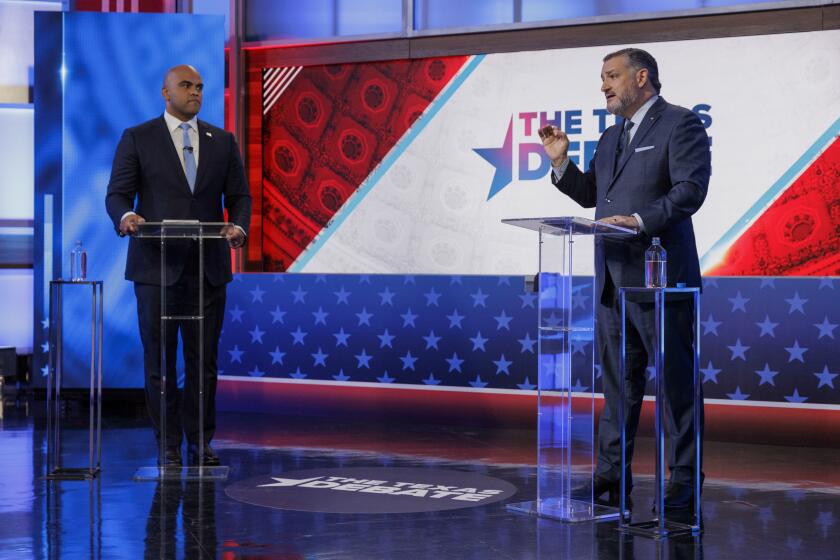Sanity Can Still Prevail--if We Take Risks for Peace
Congress votes today on $100 million in military assistance for the contras. President Reagan offers a stark challenge: Vote for this aid or accept his diagnosis of a “malignancy in Managua” that could metastasize and become “a mortal threat to the entire New World.”
The Administration has obscured the facts, so it is no wonder that so many citizens are confused. The contras are compared to freedom fighters akin to our Founding Fathers or the Royal Air Force. The dilemma has been reduced to a no-win choice between those who might drag our sons into war in Central America and those who might conciliate until we are defending ourselves on the Texas border.
But sanity can still prevail. Those who oppose contra aid are not suggesting that we let the Soviets become a dominant power in this hemisphere. Congress is working on constructive proposals, but, because no alternative is possible unless the package is rejected, the details will have to be hammered out after today’s vote. There are risks, but they are not nearly so serious as those inherent in the President’s escalation of the conflict.
One risk is betting that democracy is tough enough, and worth enough, to stand up to communism and win. Today there are more functioning democracies in Central and South America than ever before. Their future is not guaranteed, for there are severe economic problems and deep-seated clefts in the social fabric, but they have achieved much, at great cost. We must find ways to encourage their democratic values. They also have shown initiative, wisdom and spunk in challenging U.S. insistence on a military solution in Nicaragua.
The United States should recognize and applaud the significance of this desire to find a Latin solution to a Latin problem. We should pledge our full support, assisting as appropriate but from the sidelines and without arming the contra guerrillas. While the Contadora Group has not yet produced a final, workable treaty, its progress has been steady and its objectives are supported by all the parties, including the United States. It would be tragic if the President’s belligerence obstructed this process.
Thirteen nations will meet under Contadora auspices in Panama at the end of this month to discuss an overall draft treaty, to review the recent security accord signed by Costa Rica and Nicaragua and to consider a similar agreement to protect the Honduras-Nicaragua border.
If the Contadora process succeeds, the democracies will have to take another risk--that Nicaragua will live up to the words on the paper. In a March 3 letter to Sen. Claiborne Pell, ranking Democrat on the Foreign Relations Committee, Nicaraguan Ambassador Carlos Tunnermann reaffirmed previous pledges agreeing to security provisions of the so-called Caraballeda document drafted by representatives of eight Latin governments meeting in that Venezuelan town in January. In addition, Nicaragua affirms that once contra aid is halted and a treaty signed, it will end the state of emergency and grant the contras amnesty with full political rights.
We do not know how well Nicaragua would comply with such an agreement. If we do not try, we will never know. For the Central Americans themselves, this brave attempt to end 100 years of regional animosity and bloodshed is certainly worth the effort. And because of these past antagonisms there will be no blind trust in Sandinista words, no slackening of concern that Nicaragua might continue attempts to export its repressive system of government. If the Sandinistas then defaulted, U.S. support for sanctions against Nicaragua would be welcome. In contrast, our current one-country vendetta against Nicaragua antagonizes our friends as well as the target.
Continued military support for the contras would be a cruel and futile risk. Despite substantial overt and covert assistance, the contras have yet to achieve any sustained military success or establish a genuine resistance movement within Nicaragua. To give them training, vastly improved weapons and ammunition will result only in more deaths. Military victory is impossible without unified political goals and a convincing program to deal with the country’s social and economic problems.
We may quibble over how many or few Somoza guardsmen are in the contra ranks, or how many atrocities have been committed, but most Nicaraguans consider the contras a mercenary force doing America’s bidding. They are not a credible democratic alternative to the Sandinistas.
There is little risk that the Soviets will underestimate U.S. resolve to quarantine the Sandinistas and prevent the spread of communism. They know that we would never allow Soviet military bases in Nicaragua. Friendly democracies in Central America share our desire to exclude communism and will isolate the Sandinistas unless they carry out promised internal reforms.
If the Sandinistas renege on a fair treaty, military force might eventually be required to ensure security in Central America. But before provoking that response, the Sandinistas and their foreign advisers should remember that they would then face not just the contras and divided American public opinion. They would also confront the overwhelming majority of American countries, united under the Rio Treaty and buttressed by international public opinion.
Members of Congress who will vote against contra aid today have weighed all these risks and have concluded that their decision will strengthen our relations with Latin neighbors, reduce armed conflict in Central America and help make democracy possible for all the Americas.
More to Read
Sign up for Essential California
The most important California stories and recommendations in your inbox every morning.
You may occasionally receive promotional content from the Los Angeles Times.










